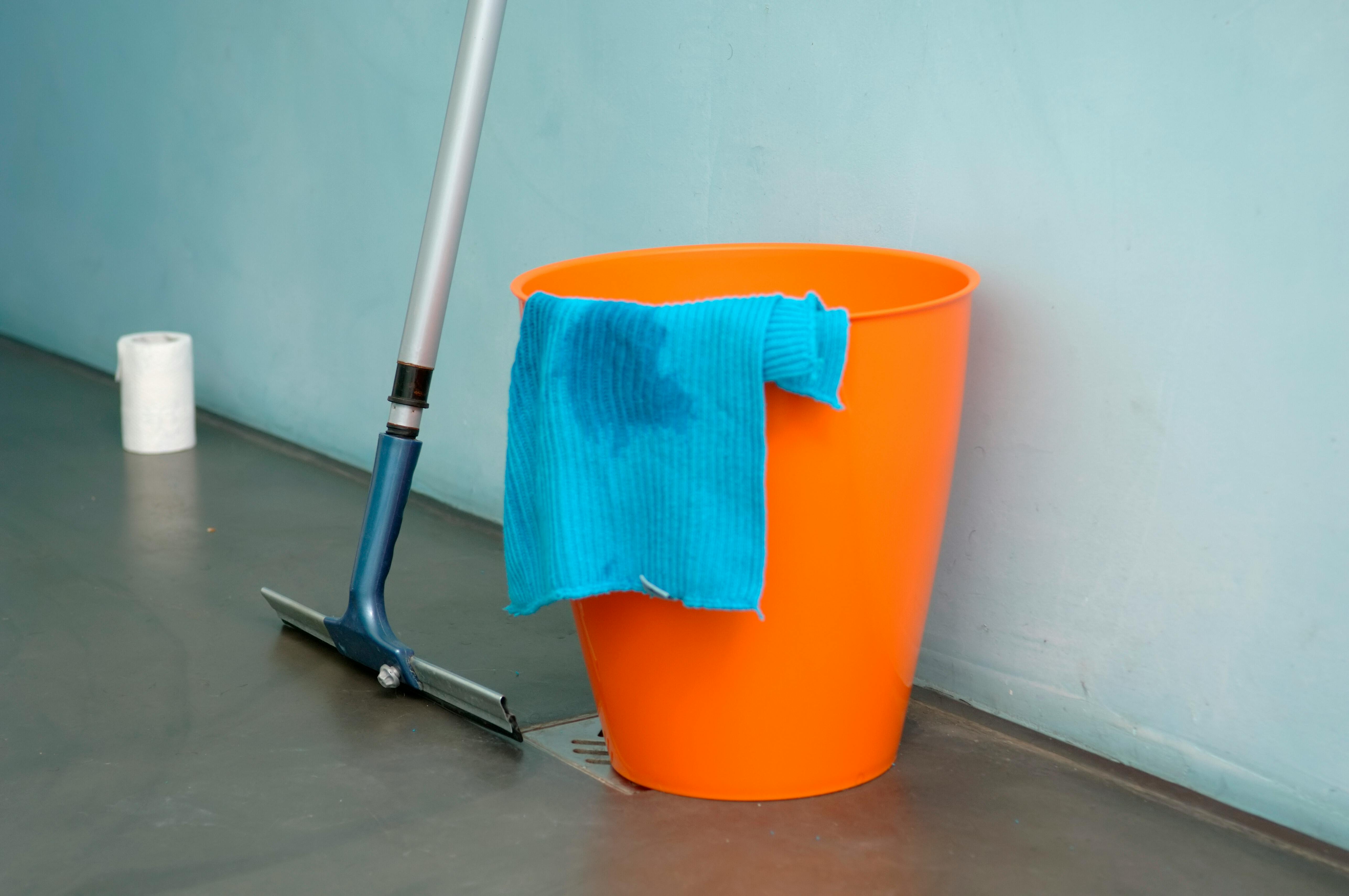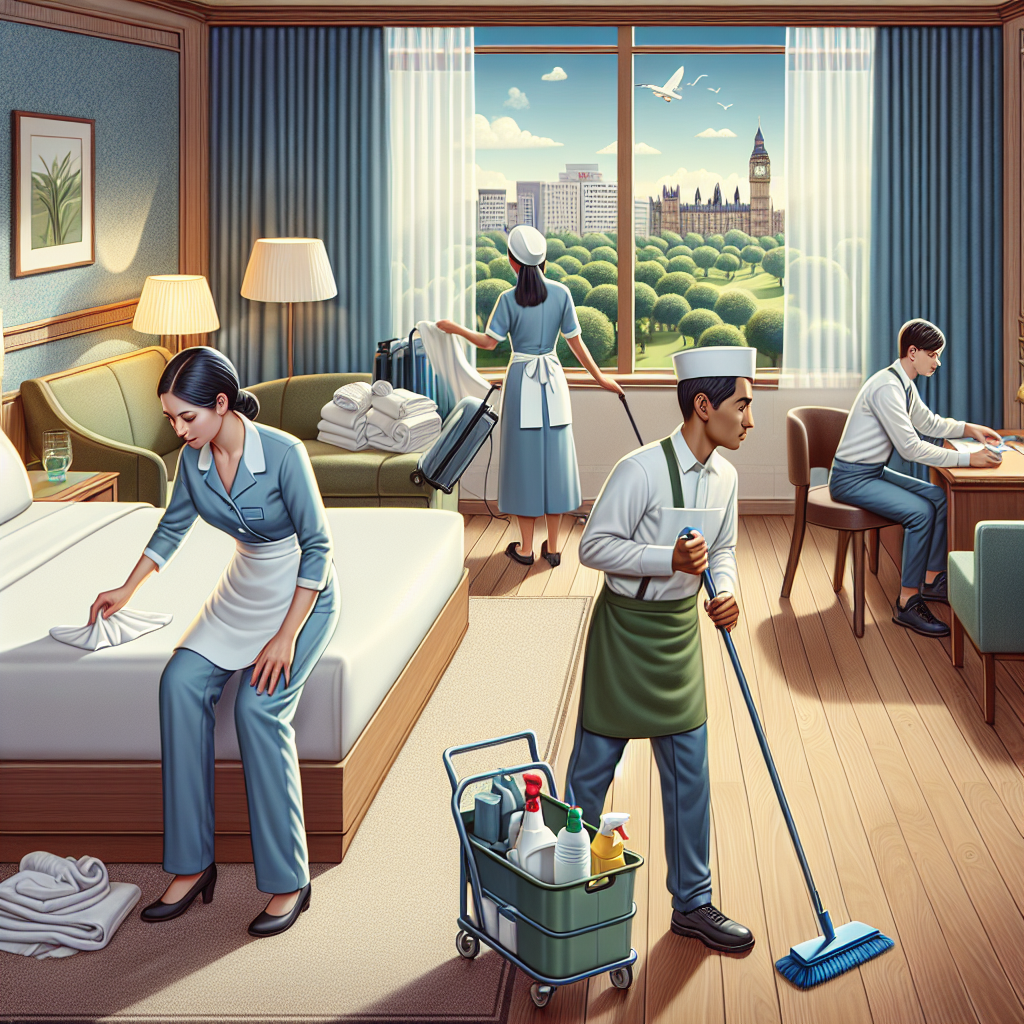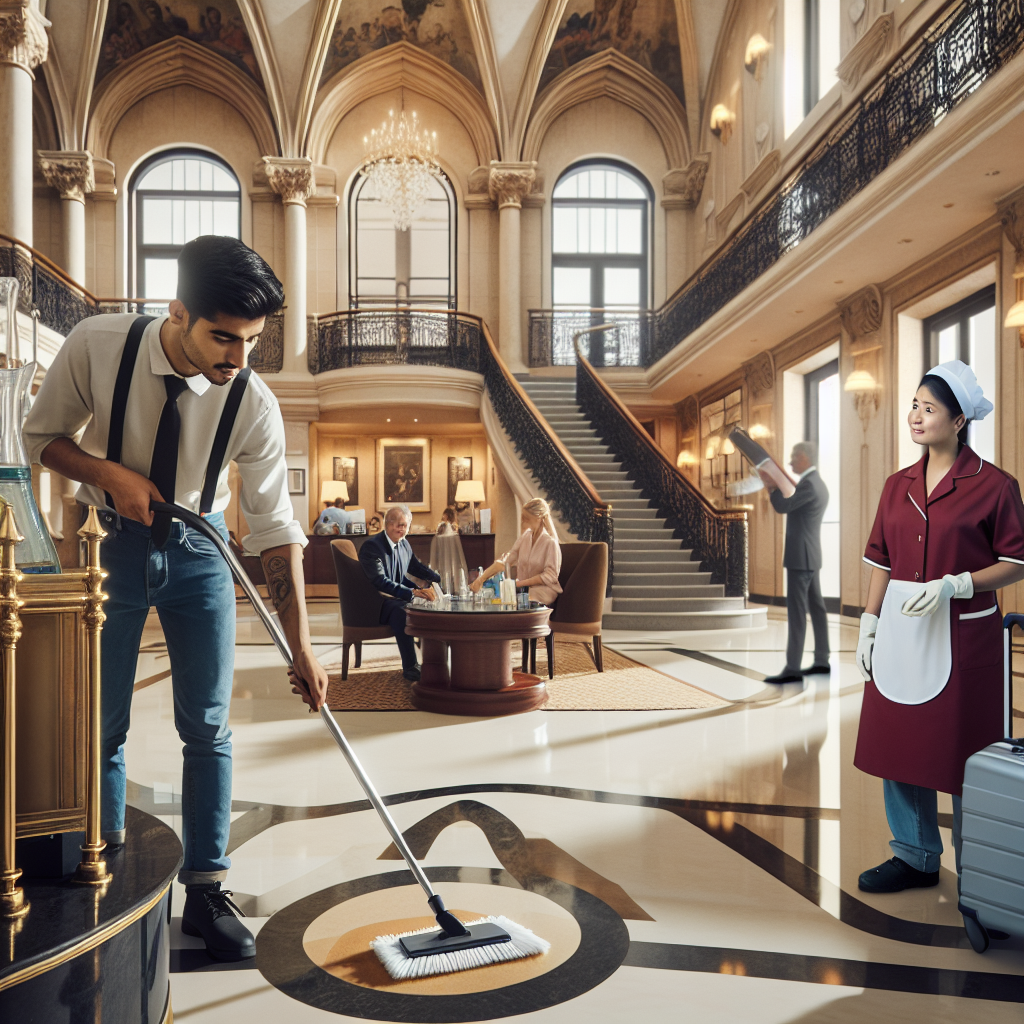Essential Tips for Hotel Cleaning in Brisbane
In the bustling city of Brisbane, hotel cleanliness is paramount. It's a key factor in guest satisfaction and retention.
But maintaining high standards of cleanliness is not a simple task. It requires a deep understanding of cleaning techniques, the right tools, and a dedicated team.
Brisbane's unique climate also presents its own challenges. From managing humidity to seasonal cleaning requirements, hotel owners and managers must be prepared.
This guide aims to provide essential tips for hotel cleaning in Brisbane. Whether you're a hotel owner, manager, or part of the housekeeping staff, you'll find valuable insights here.
We'll explore everything from daily cleaning tasks to the role of technology in housekeeping. We'll also delve into the benefits of outsourcing versus in-house cleaning services.
So, let's embark on this journey to elevate your hotel cleaning standards in Brisbane.
Understanding the Importance of Hotel Cleanliness
Hotel cleanliness plays a crucial role in creating positive first impressions. It's often the first thing guests notice upon arrival. A spotless hotel reflects professionalism and attention to detail.
Cleanliness directly impacts guest satisfaction and loyalty. Guests are more likely to return if they have had a positive experience. Clean hotel rooms and common areas contribute significantly to their overall impression.
In the age of online reviews, cleanliness can make or break a hotel's reputation. A single negative review about hygiene can spread quickly. Guests rely on reviews to make booking decisions, making it essential to maintain high standards.
Here are some key reasons why cleanliness matters:
Enhances guest satisfaction and loyalty.
Supports health and safety standards.
Boosts reputation through positive reviews.
Increases chances of return visits.
A clean hotel signifies a commitment to quality service. It shows guests that their comfort and safety are prioritized. With consistent cleanliness, hotels can build trust and ensure guest retention.
Brisbane's Unique Cleaning Challenges
Brisbane presents unique challenges for hotel cleaning due to its subtropical climate. High humidity levels can lead to mold and mildew, particularly in poorly ventilated areas. Regular inspections and effective air circulation are crucial to mitigate these issues.
The presence of insects is another challenge hotels face in Brisbane. With warm temperatures year-round, pests like ants and cockroaches thrive. Regular pest control measures and vigilance in cleaning can help prevent infestations.
Seasonal storms can also impact the cleanliness of outdoor hotel areas. Heavy rain can cause debris buildup, leading to clogged drains and slippery paths. Routine maintenance and prompt cleaning after storms are essential to maintain a safe and inviting environment.
Overall, understanding these local climate conditions aids hotels in adapting their cleaning routines. This ensures a consistently clean environment, regardless of external factors.
Daily Cleaning Tasks: Creating a Consistent Routine
A consistent daily cleaning routine is vital for maintaining hotel standards. It ensures every part of the hotel, from guest rooms to common areas, remains inviting and hygienic. This routine helps eliminate any overlooked tasks, maintaining overall cleanliness.
Start by prioritizing high-traffic areas such as lobbies and corridors. These spaces encounter the most use and often need more frequent attention. Regular vacuuming and dusting are crucial to keep them spotless and welcoming.
Guest rooms demand meticulous attention to detail. A thorough approach maintains guest satisfaction and comfort. Develop a comprehensive checklist for tasks such as:
Changing bed linens
Emptying trash bins
Sanitizing surfaces
Replenishing toiletries
Bathrooms are another critical focus area. Ensure thorough cleaning and sanitizing routines are applied daily. Keep an eye on details like mirrors, fixtures, and floor tiles to maintain a pristine appearance.
By adhering to a reliable daily cleaning schedule, hotels can consistently offer a pleasant experience to all their guests. This practice fosters guest loyalty and positive reviews.
High-Touch Areas: Special Attention Required
High-touch areas in hotels are critical points for cleaning. These spots accumulate germs quickly due to frequent use. Paying close attention to these areas helps prevent the spread of infections.
Such areas include doorknobs, elevator buttons, and light switches. Remote controls in rooms and handrails in hallways also demand regular cleaning. Regular disinfection of these surfaces is essential.
Incorporate a checklist to ensure no area is missed. Focus on the following high-touch areas:
Door handles and locks
Telephone handsets
Room keys and card readers
Bathroom taps and flush handles
Use approved disinfectants that eliminate harmful pathogens effectively. Regular staff training is vital for consistent cleaning of these surfaces. Proper cleaning methods ensure maximum effectiveness of the disinfectants.
By prioritizing high-touch areas, hotels can significantly enhance guest safety and comfort. Consistently addressing these spots fosters a healthier and more welcoming environment for all visitors.
Eco-Friendly Cleaning Practices for Brisbane Hotels
Hotels in Brisbane can greatly benefit from adopting eco-friendly cleaning practices. These methods not only help the environment but also enhance the hotel's image. Guests today prefer staying in establishments committed to sustainability.
To implement green cleaning, hotels should choose biodegradable and non-toxic cleaning products. Utilizing reusable cleaning materials can significantly reduce waste. Additionally, conserving water during cleaning tasks is vital in maintaining eco-friendliness.
Consider the following eco-friendly practices:
Use microfiber cloths and mops
Opt for concentrated cleaning solutions
Implement a recycling and waste management plan
Train staff in environmentally safe cleaning methods
Switching to energy-efficient equipment aids sustainability efforts. This switch also results in cost savings over time. It's essential to regularly assess cleaning supplies and practices for environmental impact.
By embracing eco-friendly strategies, hotels in Brisbane can maintain high standards of cleanliness while minimizing their carbon footprint. This approach attracts environmentally-conscious guests and helps create a positive brand reputation.
Training Staff in Modern Cleaning Techniques
Training staff in modern cleaning techniques is crucial for maintaining a clean and welcoming hotel environment. Cleanliness plays a significant role in guest satisfaction, which directly impacts a hotel's reputation. Proper training ensures that all team members know the latest practices and standards.
In Brisbane, it's important to train housekeeping staff on new cleaning products and methods. Hands-on workshops can be an effective way to demonstrate correct techniques. These sessions encourage practical learning and boost staff confidence in their skills.
Regularly updating training programs keeps staff informed about industry trends. For instance, newer cleaning technologies can revolutionize how tasks are completed. Training should also focus on efficiency and safety to avoid potential hazards.
An investment in staff development translates to a more competent workforce. When staff members feel valued and informed, they are more likely to take pride in their work. This, in turn, leads to better cleanliness standards and satisfied guests.
The Role of Technology in Enhancing Housekeeping Services
Technology is revolutionizing hotel cleaning services, offering new tools to improve efficiency. Automated cleaning equipment, like vacuuming robots, can handle repetitive tasks, freeing staff for more detailed work. This integration of technology allows for faster and more thorough cleaning processes.
Smart management systems are also changing how cleaning tasks are planned and executed. These systems enable managers to track housekeeping tasks in real time and make adjustments as needed. Such innovations lead to better staff coordination and more effective cleaning routines.
Additionally, technology aids in maintaining high safety standards through automated chemical dispensation systems. These systems ensure the precise use of cleaning solutions, minimizing waste and avoiding potential safety hazards. Overall, technology provides valuable support to housekeeping teams, allowing them to deliver superior cleaning services.
Outsourcing vs. In-House: What's Best for Your Hotel?
Deciding between outsourcing and in-house cleaning services involves analyzing several factors. Outsourcing can provide access to professional expertise and specialized equipment, enhancing cleaning quality. It also allows hotel management to focus on core operations rather than housekeeping details.
In-house cleaning, however, gives hotel management direct control over cleaning standards and practices. This approach can foster a sense of accountability and belonging among staff, leading to consistently high-quality work. Tailoring routines to specific hotel needs becomes much easier when the staff is internal.
Cost is another critical consideration in this decision. Outsourcing often includes predictable costs and reduced logistical headaches. In contrast, in-house teams can offer flexibility and adaptability, adjusting processes quickly in response to changing needs. Ultimately, the best choice depends on hotel size, budget, and specific cleaning requirements.
Customizing Cleaning Services to Your Hotel's Needs
Every hotel is unique, and so are its cleaning requirements. Customizing cleaning services ensures that these needs are effectively met. Tailoring services allows for flexibility, adapting cleaning routines to the specific demands of your property.
Consider factors such as hotel size, guest demographics, and the types of amenities offered. Different areas in your hotel may require unique cleaning techniques or schedules. A boutique hotel and a large chain property will have different needs.
Working closely with your cleaning team or provider to identify and prioritize these needs is crucial. This collaboration allows for a more efficient cleaning operation and enhances guest satisfaction. Tailored services ensure that the quality of cleaning aligns with the brand identity and guest expectations.
The Impact of Reviews on Hotel Cleaning Standards
In today’s digital age, guest reviews play a crucial role in shaping hotel reputations. Cleanliness ranks highly in most reviews, influencing potential guests' decisions significantly. Positive reviews about cleaning can boost a hotel’s status.
Negative feedback on cleanliness can have the opposite effect, driving potential guests away. Thus, monitoring reviews and promptly addressing cleanliness concerns is essential. Regularly responding to feedback shows guests that their opinions are valued.
Hotels should use reviews as a tool for continuous improvement in cleaning services. Analyzing feedback helps identify areas needing attention, allowing for targeted enhancements. This proactive approach maintains high cleaning standards and enhances guest trust.
Seasonal and Deep Cleaning: Planning for the Year Ahead
Seasonal cleaning involves preparing for changes in weather and guest activity levels. Brisbane's climate can affect cleaning schedules and methods. It's essential to plan for these shifts to maintain cleanliness consistently.
Deep cleaning goes beyond routine tasks, tackling areas often overlooked. Scheduled regularly, it ensures high standards throughout the hotel. It also prevents maintenance issues and enhances the longevity of furnishings.
Planning for both seasonal and deep cleaning requires a structured approach. Creating a detailed calendar helps allocate resources efficiently. This foresight ensures hotels remain pristine, meeting guest expectations year-round.
Addressing Guest Concerns and Feedback Effectively
Responding to guest concerns quickly is crucial for maintaining hotel reputation. Effective communication is key to resolving issues. Staff should be trained to listen and address complaints professionally.
Feedback provides valuable insights into areas needing improvement. Utilizing guest feedback can help refine cleaning processes. Encourage guests to share their thoughts through surveys and reviews.
Addressing feedback shows guests that their opinions matter. It fosters trust and demonstrates a commitment to excellence. Regularly updating cleaning protocols based on guest input ensures continual improvement.
Conclusion: Maintaining Excellence in Hotel Cleaning
Achieving excellence in hotel cleaning is a continuous process that requires dedication. Consistent efforts ensure a spotless environment for guests. High standards lead to positive guest experiences and repeat visits.
Staying updated with the latest cleaning techniques enhances efficiency. Both technology and eco-friendly practices play a crucial role. Staff training and feedback utilization are equally important for maintaining standards.
Hotels should always strive for improvement, keeping guest satisfaction at the forefront. By prioritizing cleanliness, hotels not only meet but exceed expectations. This focus on quality creates a lasting, positive impression for every visitor.



